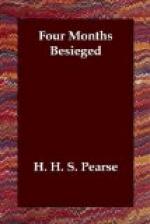November 21.—The cannonade begins again at daybreak with some shots at our scouts, who are trying to feel their way out through the scrub between Bulwaan and Lombard’s Kop. The Boers have mounted a 40-pounder high-velocity gun on the spur of the latter, and give us a taste of its quality by throwing several shells into the Fusilier camp at Range Post and bursting shrapnel over the town. The bombardment finishes about dusk with some vicious shots from Bulwaan. After this we sit and watch the lightning which plays in forks and zig-zags and chains about the hills between us and Tugela River. For such picturesque effects there is a great advantage in being encamped on a height, so that the whole panorama of rugged kopjes, deep ravines where spruits or rivers sing, silent camp, and sleeping town stretches round one, bounded only by an amphitheatre of higher hills.
November 22.—From half-past eleven last night there was heavy musketry fire near the north-eastern line of our defensive works, and we thought the Devons were being attacked hotly, but it turned out to be nothing more than a fusilade from Boer rifles at some unknown objects. Our foes are evidently getting a little jumpy and apprehensive of a surprise by night. Sir George White sends out later a flag of truce to protest against the persistent shelling of the Town Hall, where our sick and wounded are lodged temporarily under the protection of a Red Cross flag. Commandant Schalk-Burger is said to have replied somewhat insolently that he understands the Geneva flag is being used by us to shelter combatants. At any rate Intombi is the place for our sick and wounded, and he will not respect any other hospital flag. Curiously enough we accept this humiliation, so far as to remove the patients and provide for them a camping-ground where the tents cannot be seen; but the Red Cross flag still flies on the Town Hall. Again we watch the beautiful effects of almost continuous




